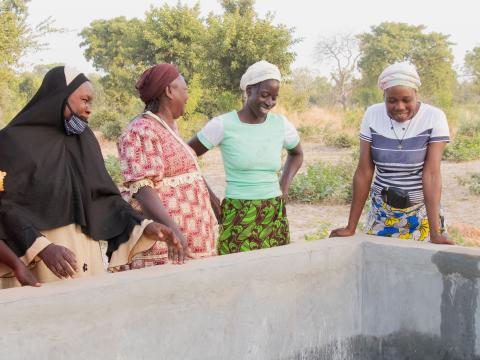Burkina Faso : Water, a real source of resilience for communities

In conflict-affected areas or areas hosting displaced people, communities often face challenges such as access to drinking water, food and poverty. Forced to abandon their livelihoods to escape violence, some families find themselves without activities or income.
As productive and resilient livelihoods are essential to breaking the cycle of poverty, World Vision is empowering families to take good care of their children by building their skills and improving their access to income, through its "Integrated support to food security and livelihoods of vulnerable populations affected by the security crisis" project in the Boucle du Mouhoun region in Burkina Faso.

The project's resilience-building activities included the construction of boreholes equipped with solar systems, community fountains and training in various trades.
In Tionkuy, about fifteen kilometres from Dédougou, two autonomous solar-powered water stations were built, one on a plot of 11,974 m2 and the other on a plot of 10,657m2.
The two plots were then divided up and allocated to 60 women for market gardening and growing of off-season crops.

Justine, 39, a mother of six, is one of the women who has been trained to run the autonomous market gardening water station.
"I was lucky enough to be one of the women selected by World Vision to run the market gardening sites. It's something I used to do in my village, but when I moved here, I didn't have the space or water to do it again," Justine explains.

Indeed, the issue of arable land and the water availability is a major concern for displaced people wishing to carry out agricultural activities in the host areas. In Tionkuy, World Vision pleaded with the village leaders to provide two plots of land available for the women to start their activities after the market gardening training.

"World Vision's contribution is invaluable. First of all, they trained us, because we didn't have all the knowledge we needed for this activity. Then they negotiated the land for us and built two autonomous water stations of 10m3 each with four 8m3 storage basins. We have water at all times for our crops" says Justine, before adding:
"World Vision has rebuilt our lives, otherwise my children would be on the streets right now. This activity has enabled us to have healthy food for the family and to meet other basic needs through by selling surplus crops".
...
"There are 30 women on each site, and we help each other. The activity requires a lot of commitment but personally I'm ready because it's an activity I have done, and I have to work hard to provide for my children".
"We are very grateful to World Vision for this tremendous support. And we intend to carry out this activity as a token of our gratitude".
By Noëlie Wendpanga Sawadogo, Country Communication specialist.